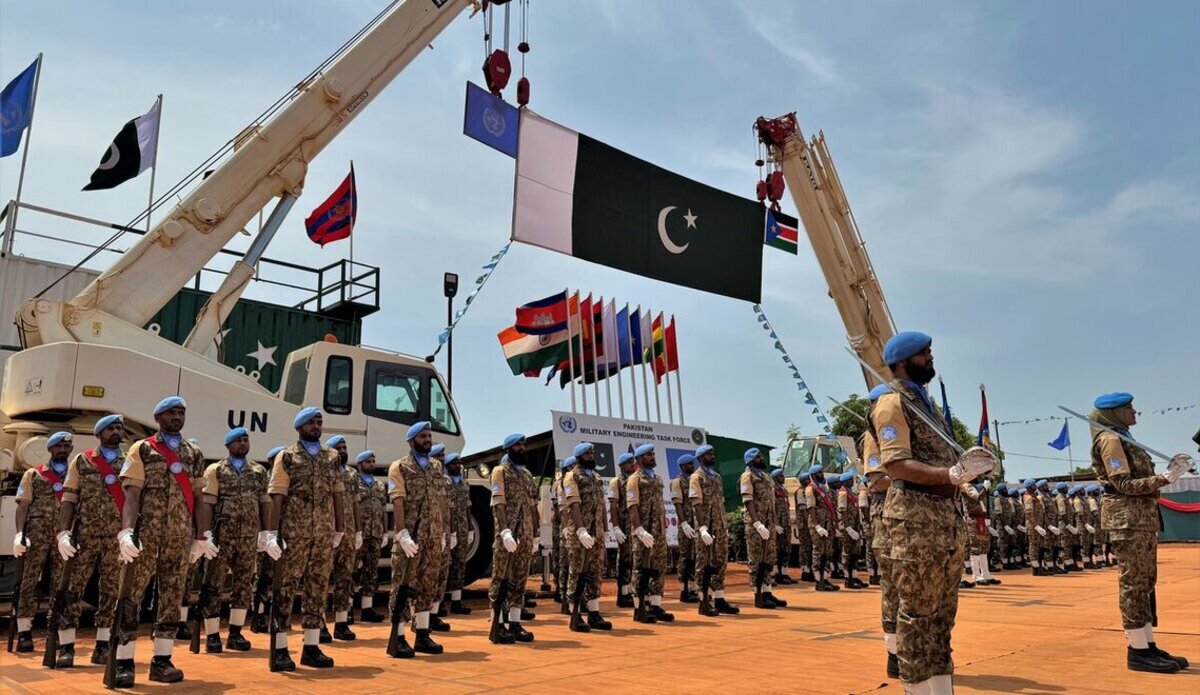
In an unexpected yet heartening acknowledgment of Pakistan’s peacekeeping contributions, an Indian general has commended Pakistani forces for their humanitarian efforts in South Sudan, particularly in assisting those affected by devastating floods. Lieutenant General S. Mohan, the Indian Force Commander for the United Nations Mission in South Sudan (UNMISS), praised the Pakistani peacekeeping contingent for their tireless efforts to provide aid and safety to Sudanese communities amid natural disasters. Despite the historical and ongoing tensions between India and Pakistan, this recognition from an Indian official highlights the global appreciation of Pakistan’s role in peacekeeping and humanitarian relief operations. This acknowledgment underscores the ability of peacekeeping missions to foster respect and understanding beyond national boundaries, with Pakistani forces setting a commendable example.
Pakistan has been a crucial player in United Nations peacekeeping missions worldwide, with over 200,000 Pakistani troops having served in various capacities since the country’s initial involvement in UN peacekeeping in the early 1960s. This contribution ranks Pakistan among the top troop-contributing nations to the UN, and their involvement has brought stability to regions affected by conflict, insecurity, and humanitarian crises. In Sudan, the Pakistani contingent is part of a multinational peacekeeping effort tasked with providing a range of services, from medical aid and logistical support to engineering and infrastructure repair.
The commitment of Pakistan’s peacekeepers goes beyond typical military roles, as they frequently undertake engineering, medical, and logistical challenges in harsh conditions to ensure the safety and welfare of civilians. In Sudan, Pakistani forces have gone above and beyond their official duties to assist flood-affected regions, showcasing their operational expertise and humanitarian focus. This dedication has not only strengthened Pakistan’s standing within the UN but also among the local Sudanese population, who view Pakistani peacekeepers as a lifeline in times of disaster.
Sudan has faced severe and recurring flooding in recent years due to extreme weather patterns exacerbated by climate change. In the latest crisis, torrential rains overwhelmed the Arbaat Dam, resulting in floods that submerged entire villages and displaced thousands of people. The impact on infrastructure was severe, with homes, roads, and public facilities destroyed, leaving communities stranded and in need of immediate help. Reports estimate that nearly 250,000 people were affected by the floods, with dozens of confirmed fatalities and many more at risk due to a lack of food, clean water, and shelter.
The Pakistani contingent in Sudan took prompt action, mobilizing their resources and personnel to rescue stranded civilians, provide essential supplies, and secure flood-affected areas. Their efforts included building makeshift shelters, establishing relief camps, and distributing food and medical supplies to those in need. In addition to these immediate relief measures, Pakistani engineers worked on constructing temporary barriers to prevent further flooding, a task that required considerable skill and adaptability under pressing circumstances.
In a formal letter to Pakistan’s Chief of Army Staff General Asim Munir, Lt. Gen. S. Mohan expressed his gratitude for the Pakistani contingent’s outstanding efforts. The letter highlighted the professionalism, commitment, and bravery displayed by Pakistan’s peacekeepers in Sudan, emphasizing how their dedication had saved lives and brought comfort to those in dire need. The recognition by an Indian official adds an unexpected layer of diplomacy to this humanitarian mission, as relations between Pakistan and India remain strained due to political and territorial disputes, including those over Kashmir.
The commendation from Lt. Gen. Mohan is noteworthy because it signals an acknowledgment of Pakistan’s contributions in a purely humanitarian context, separate from the bilateral tensions between the two countries. The general’s words resonate with the spirit of international cooperation, as he emphasized the shared mission of UN peacekeepers to alleviate human suffering, irrespective of nationality or geopolitical concerns. This gesture serves as a reminder of the power of humanitarian efforts to bridge divides and create mutual respect even in the most challenging international relationships.
The praise from Lt. Gen. Mohan underscores that acts of humanity can transcend political differences. The commendation of Pakistan’s peacekeepers serves as a reminder of the importance of international cooperation, particularly when addressing humanitarian crises. While Pakistan and India remain at odds on many issues, the recognition of Pakistani forces’ contributions in Sudan offers a momentary but meaningful bridge between the two countries.
As Pakistan continues to contribute to global peacekeeping, the efforts of its military personnel in Sudan reaffirm its commitment to a humanitarian mission that transcends borders. This instance of cross-border appreciation highlights the potential for countries to find common ground in acts of compassion and service.
